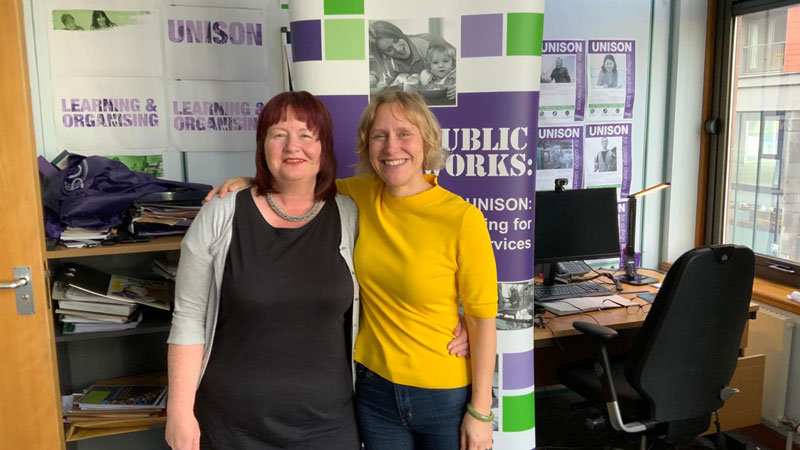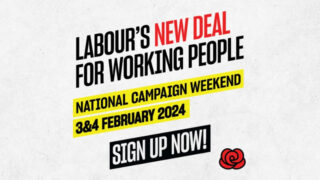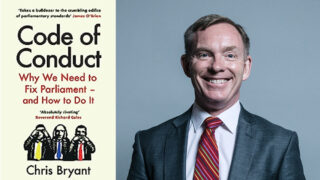Polly Jones © Trussell Trust/Chris Lacey
It’s one of the dreams of democracy: to decide that you want to serve your community, in a political capacity. In the UK, that might be as a councillor, an MP, MSP, even as a minister. Despite the shabby efforts of those in the current Tory government, the ideal remains.
And yet, for Polly Jones, this dream became a nightmare, before it even got started – when she was sacked from her job for simply expressing an interest in standing as a Scottish Labour candidate in the 2019 general election.
Polly’s treatment at the hands of her employer, the Scottish Federation of Housing Associations (SFHA), led to a long legal battle and, ultimately, a landmark ruling that “participation in democracy” is a key right under the Equality Act – meaning that employers cannot discriminate against staff for political activity in their own time.
And UNISON was with her, every step of the way.
A former UNISON international officer for 10 years (2003-2013), Polly and her family moved to Scotland in 2017, where she first managed a project called Menu for Change, which investigated ways in which society might end the need for food banks.
She joined the SFHA in April 2019, in the senior role of head of membership and policy. In October that year, Boris Johnson called a snap election and Polly decided she’d like to put her name forward for selection as a Scottish Labour candidate, for her constituency of Argyle and Bute (held by the SNP).
“This was not a shoe-in,” she says. “Where I live, they’ve never had a Labour elected representative. But Labour wanted an all-women shortlist, and they were struggling to find anybody who would even be prepared to stand. I wasn’t expecting in a million years to get elected. It was more a point of principle – we had to have at least one woman candidate from here.”
The SFHA is politically neutral. There was a clause in Polly’s contract headed “political activity”, which permitted membership of a political party, provided that the claimant should not hold any “formal role”.
However, what counted as a “formal role” was not defined. It was unclear whether under her contract she could put her name forward to a Labour selection panel as a prospective candidate; nor whether, if selected, she could pursue an election campaign.
A surprising ultimatum
When Polly started her job, such issues were irrelevant; she wasn’t to know that Johnson would suddenly call an election a few months later. In any case, usually at this point an employee could expect to have discussions with their employer about how to seek election without impacting on their job – committing to campaign in their own hours, perhaps taking unpaid leave, ensuring that the employer is not mentioned in political activity, and so forth.
However, when Polly told her boss, SFHA chief executive Sally Thomas, of her desire to simply put her name forward, none of that happened. Instead, she was given a surprising ultimatum – to choose between standing for selection, and keeping her job.
With a family who relied on her income, and little chance of winning (even if selected), Polly chose her job. But then, just five weeks later, she was dismissed anyway.
“I was sat in a school hall on a dark and damp November evening, waiting to take my children home from football training, when the email arrived sacking me with immediate effect. I wasn’t allowed back to work to collect my things, or say goodbye to colleagues.
“Losing my job overnight, feeling powerless to stop it and shocked by the injustice, was like being punched in the stomach. I felt at a complete loss. I felt like I’d lost everything, my job, my reputation, my ability to get another job. And it was so deeply unfair as well. How do I even begin to explain to people what had happened? How do I put the record straight?”
Polly says that the the employer used the fact that she was at the end of her probationary period, to dismiss her and not continue the contract, giving “14 pages of all this stuff I didn’t recognise, or had never been mentioned before, that I had supposedly been rubbish at.” But she has ample evidence of the chief executive being pleased with her performance. Moreover, “the chief executive had said the most substantive issue for her was that I’d asked to stand as a candidate. There’s a thing an employer can claim around ‘trust and judgement’. And she said, ‘because you’d asked to stand as a candidate, it makes me question your judgement.’”
Participatory democracy
Since Polly hadn’t been employed at the federation long enough (two years) to be able to claim unfair dismissal, she was at a loss as to how to challenge what had happened to her. And so she turned to UNISON.
“I’ve been a trade union member for over 20 years, since my first job. I’ve been on marches and provided active solidarity to other trade unionists standing up for themselves over that period, but this was the first time I needed help myself.”

Mandy McDowell and Polly Jones © Danny Phillips
She first approached her UNISON regional officer, Mandy McDowell, who then engaged with the union’s solicitor, Thompsons. They saw an opportunity to lodge a case under the Equality Act 2010, which can be taken by people with any length of service. Their claim was that Polly had been discriminated against because of her belief in “participatory democracy.”
The employment tribunal met in November 2020, when the UNISON lawyers argued that it should be unlawful for an employer to dismiss someone for wanting to stand as a parliamentary candidate, as this was a vital democratic role.
The tribunal found in Polly’s favour, stating: “The claimant has a protected belief under the Equality Act 2010, specifically that ‘those with the relevant skills, ability and passion should participate in the democratic process’.”
The SFHA challenged the decision, so the case went to the employment appeal tribunal, which convened twice, in December 2021 and January 2022, with the judgement published in July.
The findings
The appeal judge again found for Polly under the Equality Act, stating that, “but for her candidacy for Scottish Labour she would not have been dismissed.”
Unlike the initial ET judge, the appeal judge did not find that she could be unfairly dismissed under employment law. Nevertheless, Polly now had enough to return to the employment tribunal and claim discrimination. Before that happened, the SFHA decided to settle, and Polly accepted.
She says proudly: “We’ve now got a protected belief under the Equality Act that you can participate in democracy, which is much broader than saying you can simply stand as a candidate. For trade unionists it’s fantastic, because by protecting that belief, it means that employers cannot discriminate against us for campaigning, in our own time, being a member of a political group, being active, being a candidate, going into political meetings, any of that stuff. That is protected under the Equality Act, which is bloody strong law.”
A protected characteristic
UNISON regional manager Peter Hunter adds: “Many employees in Scotland have contracts which bar them from taking part in party political activity. No offence to our councillors and parliamentarians, but it might be argued we need all the talent we can get.
“Polly’s case means that it may be unlawful to ban staff from that civic commitment of standing for election, or just getting involved in democracy.
“Your political beliefs are a protected characteristic and this will have far reaching consequences, particularly in the public sector. Civil servants and local government employees, in particular, will now be allowed to stand for election and take part in public political activity.
“Through principle and determination, Polly has changed employment law in Scotland. We hope it opens the door for all workers interested in representing their communities, locally or nationally, without interference by employers.”
Reflecting on the experience, Polly says: “There’s absolutely no way I could have done this without UNISON. Not in a million years. I was at my lowest. I’ve never felt this bad. It made me realise how important it is for us to organise in third sector workplaces, where trade unions are often weakest.
“Together with support from my friends and family, I felt really cared for, and it also helped me keep my head together. I think quite a lot of people get broken from this kind of experience.”
Moving on
It turned out that she needn’t have worried about getting another job: soon after her dismissal, she was employed by the Scottish Trade Union Council as a policy officer, and in May 2020 she became the Scotland head of food bank charity The Trussell Trust.
Has the experience in 2019 deterred her from thinking about putting herself forward for political office in the future?
“It nearly did, to be fair. It’s not a straightforward process anyway. You expect it to be tough, and that you might not get there, but I didn’t expect to get my legs taken out from me before I even stood.
“My skin has got a little thicker. Also, I fought for myself with this case, but we’ve won something for other people, and that’s exactly what I’d do if I was elected – you’re there to stand up for people, to give voice to people’s concerns in a way that they can’t do for themselves. So yeah, that’s something I’m more determined about than ever.”






The article “Fighting for the right to be politically active” brings attention to an important issue that affects individuals across the globe. The right to engage in political activity is a fundamental human right, yet many people face barriers and discrimination when trying to exercise this right. The article highlights the stories of individuals who have faced these challenges and the organizations that are fighting to protect and promote political rights. It is a powerful reminder that political engagement is a critical aspect of democracy and that everyone should have the opportunity to participate. The article encourages readers to get involved in advocacy and activism to support political rights and create a more equitable and just society.